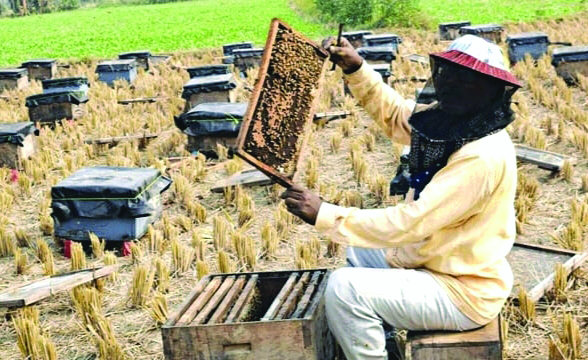Buniadpur’s honey harvest reaching Guj

BALURGHAT: Buniadpur in South Dinajpur has become a hub for honey production, with the harvested honey now reaching markets in Gujarat. This success has brought immense joy to the local honey collectors. Fields in Banshihari block and Buniadpur Municipality area are dotted with rows of boxes placed across mustard fields in Bagduar, Jamar, Jodighi, Sihal, Dittalhat and Korkha.
Ishak Ali Apu, a young honey collector from Dittal, explained: “We place the boxes before the mustard flowers bloom. These boxes house bees, which are fed sugar as a supplement. The bees collect nectar from mustard flowers and store it in the boxes. We harvest honey weekly. I started this business just last year.”
Honey traders from Murshidabad, Nadia, and South 24 Parganas have also set up boxes across local fields, aiming to make the most of the season. A Gujarat-based trader has bought honey in bulk from these fields, adding to the economic benefits of the venture. Many local collectors, who engage in other professions throughout the year, are earning substantial profits this winter through honey harvesting.
The mustard fields of Gangarampur and its surrounding areas have attracted artificial beekeepers from North 24 Parganas, Nadia and other districts. Beekeepers are setting up rows of boxes in areas like Sukdebpur, Jahangirpur, Nandanpur, Belbari and Soyrapur, harvesting honey that is being supplied to various companies.
Tarok Biswas, a beekeeper from Bongaon, shared his journey: “I started with just 14 boxes after receiving training in Barasat. Now I operate with 200–250 boxes and employ three workers. This year, I’ve come to Gangarampur for the mustard honey collection.”
Sumanta Biswas, another beekeeper from Bongaon, revealed: “We travel across the state year-round collecting honey. During winter, we come to North Bengal due to the abundant mustard fields. So far, we’ve collected around 200 kilograms of honey.”
The use of Italian Apis mellifera bees by collectors like Bhavatosh Mandal has further boosted yields, with honey being sold to companies at Rs 200 per kilogram. The trade has provided a significant economic boost to the region.



